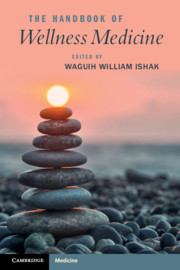Book contents
- The Handbook of Wellness Medicine
- The Handbook of Wellness Medicine
- Copyright page
- Dedication
- Contents
- Contributors
- Part I Approach to Wellness
- Part II From Illness to Wellness by Organ Systems/Disorders
- Part III Special Populations and Special Topics
- Part IV Wellness Interventions
- Chapter 22 Nutrition
- Chapter 23 Nutraceuticals and Wellness
- Chapter 24 Pharmaceuticals and Alternatives for Wellness
- Chapter 25 Exercise, Dance, Tai Chi, Pilates, and Alexander Technique
- Chapter 26 Sleep, Rest, and Relaxation in Improving Wellness
- Chapter 27 Sex, Intimacy, and Well-Being
- Chapter 28 Mindfulness, Meditation, and Yoga
- Chapter 29 Forgiveness, Gratitude, and Spirituality
- Chapter 30 Positive Neuropsychology, Cognitive Rehabilitation, and Neuroenhancement
- Chapter 31 Acupuncture, Herbs, and Ayurvedic Medicine
- Chapter 32 The Role of Aesthetics in Wellness
- Chapter 33 Massage, Humor, and Music
- Chapter 34 Nature and Pets
- Chapter 35 Circadian Rhythm in the Digital Age
- Chapter 36 The Arts in Health Settings
- Chapter 37 Engaging the Five Senses
- Chapter 38 Emotional Intelligence and Its Role in Sustaining Fulfillment in Life
- Chapter 39 Psychotherapy and Positive Psychology
- Chapter 40 Resilience and Wellness
- Chapter 41 Developing Purpose, Meaning, and Achievements
- Chapter 42 Healing and Wellness
- Chapter 43 Connection, Compassion, and Community
- Chapter 44 Wellness Interventions for Chronicity and Disability
- Part V Wellness through Optimization of Work, Love, and Play
- Book part
- Index
- References
Chapter 26 - Sleep, Rest, and Relaxation in Improving Wellness
from Part IV - Wellness Interventions
Published online by Cambridge University Press: 18 September 2020
- The Handbook of Wellness Medicine
- The Handbook of Wellness Medicine
- Copyright page
- Dedication
- Contents
- Contributors
- Part I Approach to Wellness
- Part II From Illness to Wellness by Organ Systems/Disorders
- Part III Special Populations and Special Topics
- Part IV Wellness Interventions
- Chapter 22 Nutrition
- Chapter 23 Nutraceuticals and Wellness
- Chapter 24 Pharmaceuticals and Alternatives for Wellness
- Chapter 25 Exercise, Dance, Tai Chi, Pilates, and Alexander Technique
- Chapter 26 Sleep, Rest, and Relaxation in Improving Wellness
- Chapter 27 Sex, Intimacy, and Well-Being
- Chapter 28 Mindfulness, Meditation, and Yoga
- Chapter 29 Forgiveness, Gratitude, and Spirituality
- Chapter 30 Positive Neuropsychology, Cognitive Rehabilitation, and Neuroenhancement
- Chapter 31 Acupuncture, Herbs, and Ayurvedic Medicine
- Chapter 32 The Role of Aesthetics in Wellness
- Chapter 33 Massage, Humor, and Music
- Chapter 34 Nature and Pets
- Chapter 35 Circadian Rhythm in the Digital Age
- Chapter 36 The Arts in Health Settings
- Chapter 37 Engaging the Five Senses
- Chapter 38 Emotional Intelligence and Its Role in Sustaining Fulfillment in Life
- Chapter 39 Psychotherapy and Positive Psychology
- Chapter 40 Resilience and Wellness
- Chapter 41 Developing Purpose, Meaning, and Achievements
- Chapter 42 Healing and Wellness
- Chapter 43 Connection, Compassion, and Community
- Chapter 44 Wellness Interventions for Chronicity and Disability
- Part V Wellness through Optimization of Work, Love, and Play
- Book part
- Index
- References
Summary
Sleep, rest, and relaxation are often undervalued factors that contribute to the maintenance and improvement of wellness. Sleep cycles and their given durations have been clinically proven to influence essential aspects of human life: cardiovascular health, metabolic health, mental health, immunologic health, human performance, and mortality, to name a few [1]. Inadequate sleep has known associations with increased risks of mortality, cardiovascular disease, cerebrovascular disease, obesity, diabetes, cancer, and depression. Rest, in the context of this chapter, is not necessarily synonymous with sleep – for instance, sleep can still occur without rest and its improvements on overall functioning [2]. Relaxation often corresponds to feelings of peace, comfort, body laxity, mental laxity, and positive emotions. Relaxation as a wellness tool can take a variety of forms, such as abdominal breathing and progressive muscle relaxation techniques [3].
- Type
- Chapter
- Information
- The Handbook of Wellness Medicine , pp. 324 - 331Publisher: Cambridge University PressPrint publication year: 2020



